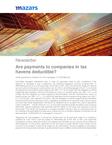
Are payments to companies in tax havens deductible?
Colombian legislation establishes that, in order for payments made to such jurisdictions ("Tax Havens") to constitute a cost or deduction, the following obligations must be complied with: 1) Withholding at source on such payments, at the rate of 33%, when the payments made are national source income for the person receiving them (art. 24, 124-2, and 408 paragraph of the E.T.), 2) Submit the operations to the transfer pricing regime (art. 260-7 E.T.) and comply with the obligation to submit supporting documentation and the informative tax return on transfer prices (art. 260-7 E.T.), and comply with the obligation to submit supporting documentation and the informative tax return on transfer prices (art. 260-7 E.T.). ), 2) Submit the operations to the transfer pricing regime (art. 260-7 E.T.) and comply -with respect to the same- with the obligation to submit supporting documentation and the transfer pricing informative return, regardless of whether their net worth and/or gross income are lower than those established in the law to be obliged to do so (except in the case of operations under 10,000UVT - D.3030 /2013 art. 2.c), 3) Document and demonstrate the detail of the functions performed, assets employed, risks assumed and the totality of the costs and expenses incurred (hereinafter "The Study") by the person or company located in the tax haven for the performance of the activities that generated such payments (unless the non-connection between the parties can be demonstrated - D.3030/2013 art. 4 paragraph 1 clause 3).
Regarding the first obligation, it should be clarified that not all payments made to a jurisdiction qualified as a tax haven must be subject to withholding tax at the rate of 33%; only payments constituting a cost or deduction that for the recipient are domestic source income will be subject to withholding tax. In this sense, payments for the purchase of goods abroad, being foreign source income for the recipient, would not be subject to any withholding. The same applies to commission payments for the purchase and sale of goods abroad, since in addition to the fact that the deductibility of the payment is expressly allowed (and is not limited to 15% of the taxpayer's net income) without withholding (art. 121-a- of the E.T.), this income is not of national source for the recipient.
Neither would be the payment of dividends, since in addition to the fact that such item does not constitute a cost or deduction, it would not be taxable for the shareholder (whether or not it is located in a tax haven), if such income is already taxed in Colombia. On the other hand, payments for technical services, technical assistance and consultancy, which in other jurisdictions not listed have a withholding tax of 10%, when made to tax havens, would have a withholding tax of 33%, since they are considered domestic source income for the person who receives them.
Regarding the second obligation, it is important to clarify that it must be complied with regardless of whether the withholding is made or not. Regarding the third obligation, in addition to being clearly unconstitutional for violating the principle of good faith and equity (because the taxpayer is required to demonstrate and document the risks, assets, costs and expenses of a third party who is not going to provide them), the law brings a contradiction in that it exempts the taxpayer from submitting supporting documentation in operations with tax havens in the case of operations of less than 10,000UVT and exempts the taxpayer from submitting supporting documentation in operations of less than 10,000UVT. 000UVT and it also exempts the taxpayer from presenting "The Study" when the non-existence of a relationship between the parties is proven, but at the same time it establishes a legal evidentiary fee for the latter, indicating that such evidence must be attached to the supporting documentation. Thus, if an operation with a tax haven is less than 10,000UVT, and therefore the taxpayer is not obliged to submit supporting documentation, how can it -legally- demonstrate the non-relation between the parties in order not to have to submit "The Study"?
If the income is from a foreign source for the person who receives it, and the payment is made to a related party, no withholding is made, but "The Study" must be prepared for the payment to be deductible. If the income is from a foreign source for the person who receives it, and the payment is made to a non-related party, there is no withholding or "The Study", and it will be deductible, notwithstanding that, in all cases, a transfer pricing study must be made.


